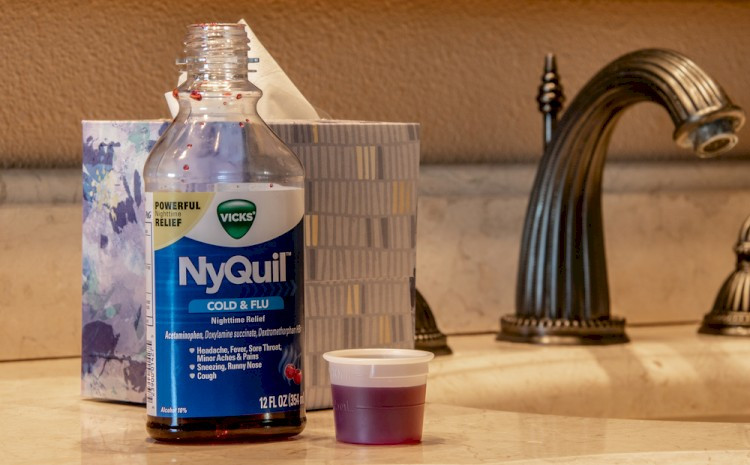Can You Take Benadryl With Nyquil?
Our pharmacist answers the latest question regarding whether or not your can take Benadryl (diphenhydramine) with Nyquil.

Question
Can I take Benadryl (Diphenhydramine) and Nyquil together?

Answered by Dr. Brian Staiger, PharmD
Medical Content Reviewed By HelloPharmacist
Staff
Last updated Jul 05, 2025
Key points
- NyQuil contains an antihistamine (doxylamine) very similar to Benadryl (diphenhydramine). Taking both is considered a therapy duplication.
- Combining NyQuil and Benadryl may increase the risk of side effects such as sedation, dry mouth, dry eyes, and dizziness.
- In most cases, only one or the other should be used. However, they are both short-acting, lasting 4 to 6 hours per dose, so both drugs could be used the same day.
Answer
In most cases, it is not recommended to take Benadryl (diphenhydramine) and Nyquil together since they both contain sedating antihistamines.
The sedating antihistamine in NyQuil is doxylamine, which is very closely related to diphenhydramine (the active ingredient in Benadryl). In fact, they are in the same class of medication, sedating first-generation antihistamines.
Taking two first-generation antihistamines together is considered 'duplicate therapy' and increases the risk of side effects occurring. In most cases, it would be recommended to just take one or the other.
What Is Benadryl?
Benadryl is classified as a first-generation antihistamine. The duration of action of the drug is typically 4-6 hours per dose (25 mg to 50 mg).
First-generation antihistamines are known for their sedative effects and CNS (central nervous system) depressant effects. Many individuals cannot tolerate the sedative effects of Benadryl (diphenhydramine) during the day and, therefore, only take it at bedtime to combat insomnia.
What Is NyQuil?
Nyquil is a combination cold/cough product that contains the drug doxylamine, along with a pain/fever reducer (acetaminophen) and a cough suppressant (dextromethorphan).
Doxylamine is a sedating first-generation antihistamine and is in the same class of medication as Benadryl (diphenhydramine).
Interaction Explained
As stated above, doxylamine and Benadryl (diphenhydramine) work the same way and are actually in the same class of medication.
They work by blocking the histamine-1 receptor in the body, which prevents histamine from binding to it and producing the symptoms we are all very familiar with (e.g. runny nose, watery eyes, etc...).
Since both drugs work the same way, using both at the same time is not recommended.
Combined use generally won't provide any more benefit than taking either alone. Additionally, taking them together not only increases the risk of excessive sedation, it greatly increases the risk of additional adverse effects such as:
- Dry mouth
- Dry eyes
- Constipation
- Constricted airways
Very high doses of sedating antihistamines have also been associated with excitation, agitation, and restlessness.
Is Use Together Ever Okay?
Having said that, there could be a case to take the combination together.
Benadryl (diphenhydramine) has fairly strong evidence for use in stemming allergic reactions.
Studies show that Benadryl (diphenhydramine) can effectively reduce itching and swelling from reactions to things like bee stings and poison ivy.
If you have already taken a dose of Nyquil and are having an allergic reaction to something, taking a dose of Benadryl (diphenhydramine) may help without a huge increased risk in intolerable side effects.
How Long To Separate
Even though Benadryl and NyQuil generally shouldn't be used together, they can certainly be taken the same day since both have a short duration of action.
Both Benadryl and NyQuil only last four to six hours per dose. Therefore, as long as they are separated by at least that amount of time, they shouldn't interact with one another.
Final Words
Thanks again for your question and please feel free to reach back out again!
-
 Dr. Brian Staiger, PharmD
Dr. Brian Staiger, PharmD
- 57827 views


